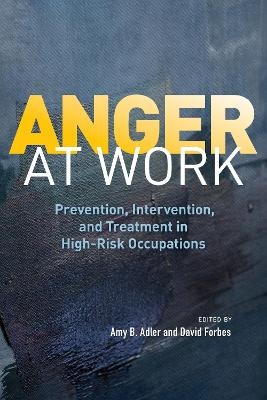
Anger at Work
American Psychological Association (Verlag)
978-1-4338-3307-6 (ISBN)
This book reveals the impact of problematic anger on job performance and in the workplace, with a particular focus on police, firefighters, and the military.
Problematic anger can cause major disruptions in the workplace. It negatively influences individual performance, and the health and well-being of entire organizations. This is a serious problem in high-risk occupations, where the consequences of prolonged, unhealthy anger can be devastating.
This book aims to help researchers and practitioners understand unhealthy, unproductive anger, and its links to problems such as depression, alcohol abuse, and PTSD.
Contributors examine new and useful conceptual frameworks such as moral injury, and risk factors including risk-taking, irritability, hypervigilance, and chronic physiological activation. Anger is examined within individual and team contexts. Treatments and interventions, including cognitive bias modification, are presented to help clinicians and practitioners put these insights to practical use.
Amy B. Adler, PhD, is a clinical research psychologist and senior scientist with the Center for Military Psychiatry and Neuroscience at the Walter Reed Army Institute of Research. She studies stress and performance in high-risk occupations, focusing on training innovation in managing emotions within teams, optimizing leadership, and enhancing resilience. She also co-leads the U.S. Army’s research on unit-level behavioral health, resilience, and readiness. Dr. Adler has extensive experience conducting research with operational units and spent more than 20 years working for the U.S. Army overseas. Her work has influenced training implementation across the army and in other nations as well. Besides serving as a U.S. representative to NATO research groups, Dr. Adler has published more than 160 articles and chapters and coedited six books. She has also led the development of an array of knowledge and training products that are designed to support unit behavioral health under high-stress conditions. She serves as an associate editor of the Journal of Occupational Health Psychology, is a recipient of the Distinguished Service Award from The Military Health Systems Research Symposium, and is a fellow of the American Psychological Association. David Forbes, PhD, is director of Phoenix Australia, Centre for Posttraumatic Mental Health and professor in the Department of Psychiatry, University of Melbourne. He is a clinical psychologist specializing in the assessment and treatment of mental health problems in trauma survivors, with a particular focus on anger and mental health in military, veteran, and high-risk populations. He led the development of the inaugural Australian Guidelines for the Treatment of Posttraumatic Stress Disorder (PTSD) approved by the National Health and Medical Research Council, was vice chair of the International PTSD Guidelines, and was lead editor on the seminal Effective Treatments for PTSD, Third Edition (2020). Dr. Forbes has a strong track record in the conduct of research in the areas of anger and trauma-related mental health across the lifespan. He is also a leading expert in the provision of policy and service development advice to government and agencies responsible for the care of those occupationally exposed to trauma and community members exposed to trauma and disaster, and the provision of training in evidence-based treatments for trauma-related disorders. He has published over 180 scientific papers and invited book chapters and sits on many Commonwealth government policy and scientific advisory panels and academic journal editorial boards. Visit https://www.phoenixaustralia.org/ and https://www.linkedin.com/in/david-forbes-342a6936/ and follow @Phoenix_Trauma.
Contributors
Acknowledgments
Why Anger Matters: An Introduction Amy B. Adler and David Forbes
I. Foundations
Chapter 1. An Overview of Anger: A Common Emotion With a Complicated Backstory Jeffrey M. Osgood and Phillip J. Quartana Chapter 2. Anger as an Occupational Health Challenge for Employees in High-Risk Occupations Thomas W. Britt, Chloe A. Wilson, Eric B. Elbogen, Elizabeth E. Van Voorhees, and Kirsten Dillon
II. Organizational Context
Chapter 3. Moral Injury and Anger in the Workplace Andrea J. Phelps, Lisa Dell, and Kim Murray Chapter 4. Emotional Culture and the Angry Team Olivia (Mandy) O'Neill Chapter 5. Anger and the Role of Supervisors at Work Leslie B. Hammer, James D. Lee, Cynthia D. Mohr, and Shalene J. Allen
III. Clinical Context
Chapter 6. Anger in Occupations Characterized by Repeated Threat and Stress Exposure: The Longitudinal View in the Military Context Ellie Lawrence-Wood, Miranda van Hooff, and Alexander McFarlane Chapter 7. The Cost of Anger: Suicide in the U.S. Army James A. Naifeh, Oscar I. Gonzalez, Holly B. Herberman Mash, Carol S. Fullerton, and Robert J. Ursano Chapter 8. Clinical Interventions for Problematic Anger Leslie A. Morland, Lisa H. Glassman, Margaret-Anne Mackintosh, and Paula P. Schnurr Chapter 9. Cognitive Bias Interventions Gal Arad and Yair Bar-Haim
IV. Future Directions
Chapter 10. Advancing Anger Research David Forbes and Amy B. Adler
Index
About the Editors
| Erscheinungsdatum | 27.08.2021 |
|---|---|
| Verlagsort | Washington DC |
| Sprache | englisch |
| Maße | 152 x 229 mm |
| Themenwelt | Geisteswissenschaften ► Psychologie ► Arbeits- und Organisationspsychologie |
| Geisteswissenschaften ► Psychologie ► Klinische Psychologie | |
| ISBN-10 | 1-4338-3307-7 / 1433833077 |
| ISBN-13 | 978-1-4338-3307-6 / 9781433833076 |
| Zustand | Neuware |
| Haben Sie eine Frage zum Produkt? |
aus dem Bereich


